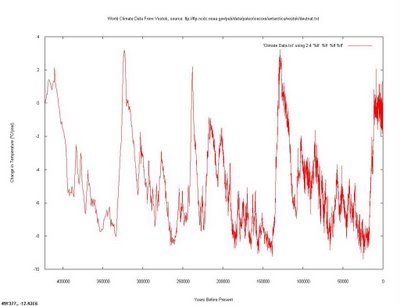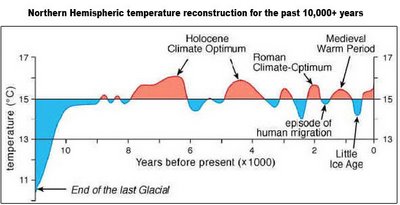Repent, ye capitalist Sinners!
This is all utter hogwash and pernicious nonsense.
Take it from a scientist. When I was studying physics at Princeton, all the physics professors I came across -- especially the crusty old experimentalists -- scoffed at the Global Warming claims, for the simple reason that the observed warming was swamped by the uncertainties in the modelling process and by the natural variability of the climate.
The same derision was applied by every physicist I worked with later at MIT.
And none of us had anything to do with either energy companies (supposedly on the one side) -- or the politically-motivated grant and publishing process (definitely on the other).
Changes in solar activity can explain much -- and we can't do anything about the Sun!
The Wall Street Journal pointed out this week that the MSM was just giving the political talking points of the summary of the report anyway, and that the full document actually contained much backpedalling of earlier doomsaying climate claims from a mere 5 years ago!
As one example, the infamous "hockey stick" graph showing temperatures shooting up in recent years was quietly omitted, because it had been seriously questioned by other researchers.
And for another, estimates of sea level increases were halved from 3 feet to 17 inches. That's a very uncertain model!
So they've suddenly got the model right now, have they?
They can predict 100 years of weather now, when next week's is still a mystery?
How much more might change in the "consensus" in another 5 years?
Science is not made by majority vote. That would be politics.
Here's a chart of temperature going back over 400,000 years from ice core samples. The scale on the left is the difference in degrees Celsius from today, so we're right at the "zero" level. Which you'll note is somewhat COOLER than the last 10,000 years (since the last ice age), though a little warmer than the last 300 -- and good thing too, as temps had been declining and a Little Ice Age was forming.

See how much temperatures can -- and usually do -- fluctuate?
Those are devastating Ice Ages in which sheets of ice A MILE THICK cover everything down to Boston. In fact, we're considered to be living simply in an "interglacial" within a larger ice age. Even with just a -1 degree drop after the Medieval Warm Period (what caused that? Certainly not heavy industry and automobiles!), it was quite bad:
The Little Ice Age (Basic Books, 2000), by anthropology professor Brian Fagan of the University of California at Santa Barbara, tells of the plight of European peasants during the 1300 to 1850 chill: famines, hypothermia, bread riots, and the rise of despotic leaders brutalizing an increasingly dispirited peasantry. In the late 17th century, writes Fagan, agriculture had dropped off so dramatically that “Alpine villagers lived on bread made from ground nutshells mixed with barley and oat flour.” Finland lost perhaps a third of its population to starvation and disease.And another chart:
Life was particularly difficult for those who lived under the constant threat of advancing glaciers in the French Alps. One, the Des Bois glacier on the slopes of Mont Blanc, was said to have moved forward “over a musket shot each day, even in the month of August.” When the Des Bois threatened to dam up the Arve River in 1644, residents of the town of Chamonix begged the bishop of Geneva to petition God for help. In early June, the bishop, with 300 villagers gathered around him, blessed the threatening glacier and another near the village of Argentiere. For a while, salvation seemed at hand. The glaciers retreated for about 20 years, until 1663. [Without fossil fuels! Imagine! -- ed.] But they had left the land so barren that new crops would not grow.

So, I don't recall the Romans worrying about rising sea levels, even though it was at least as warm then than now. The question of warming or cooling depends all on the time scale you're looking at!
Why this Global Millenial Madness? A need for doomsday and repentance. The whole thing is very enlightening; here is a taste:
The apocalyptic vision of global warming serves a deep need of the environmentalist credo, the dominant pseudo-religious tendency of our age in the prosperous West.The essay goes on to document the horrible "unintended consequences" of making drastic policy decisions to avert the imagined disasters, such as causing actual tens of millions of children to die needlessly from malaria, which was totally preventable with safe, indoor spraying of banned DDT.
For good or ill, human beings are constructed to believe, and faith has its demands...
...
When religious belief is subverted, it does not, as Chesterton implied, simply vanish. It is almost immediately replaced by another set of beliefs on a similar level of abstraction and serving the same purpose.
...
That environmentalism is in fact a pseudo-religion goes without saying. Like all such, it possesses every element of contemporary legitimate belief. It has a deity, in this case the goddess Gaia, the personification of the living Earth, (first envisioned by James Lovelock, whom we can slot in as high priest). It has its holy books, most changing with the seasons, and most, as is true of the Bible with many convinced Christians, utterly unread. It has its saints, its prophets, its commandments, religious rituals (be sure to recycle that bottle), a large gallery of sins, mortal and otherwise, and an even larger horde of devils. (Let me pause here to sharpen a horn.)
Another item that a pseudo-religion must have is an apocalypse - and that's what global warming is all about.
In fact, the apocalyptic is the major fulcrum of environmentalism, the axis around which everything else turns. It's environmentalism's major element of concern, its chief attraction, and the center of discussion and speculation, in much the same way that some Protestant variants of Christianity are obsessed above all with sin. So crucial is the apocalypse to environmentalism that there has been a whole string of them, one after the other, covering every last aspect of the natural world. If one don't git ya, the next one will.
Another horrible policy outcome was the fear of overpopulation. Now that demographics are collapsing in Europe, they find they need cheap labor, in the form of unassimilated muslims, and we know where that's heading!
The essay goes on to discuss other the faddish enivronmental doomsdays of each season, including pollution, nuclear radiation, and global famine.
And then to tie it all together:
But in fact, global warming has actually adapted elements of all previous environmental crazes. It holds that carbon dioxide (a naturally-occurring compound that comprises a large portion of the atmosphere) is a form of pollution, the same as Carson's detested synthetic chemicals. Like that involving overpopulation, the threatened catastrophe is universal, and implicated in everyday practices and institutions. As with the universal famine, the effects are concrete and horrifying, though the dates have been left vague - ‘in the coming century', rather than in a year or two. As with the nuclear freeze, the human villains are easily identified, their actions, which place all human life in jeopardy, beyond redemption. As with ozone depletion, mainstream scientists have a remedy - even if it's unproven and unnecessary.True environmentalism -- not being wantonly destructive and being a good steward of one's resources -- is a wonderful thing. It is its anti-rational component, fed by anti-capitalist politics, that is a grave threat as a hysterical mass-movement grows.
The lessons of previous environmental panics have been carefully applied to global warming No other environmentalist program has been prepared with such detail, purpose, and conviction. A skilled cadre of scientists, activists, and publicists exist who have devoted entire careers to nothing else. A vast literature has appeared analyzing not climate as a whole, not the interactions of the entire system, but solely and uniquely global warming. In many ways, warming has become both more and less than an ideology: it has become an industry, one that with such financial elements as carbon offsets can easily support itself.
The global warming program has been in play for a quarter of a century. It has been quite successful, convincing a small majority of the population that such warming is in fact occurring and is caused by manmade emissions. It is not a fad of the decade like overpopulation or nuclear winter. Nothing, not scientific evidence, not common sense, not the fact that much of the United States is basking in subfreezing temperatures as I write this, will be allowed to overturn it. The environmentalist movement has staked everything on this program. Not for the sake of science; most of the science is wrong or fabricated. (This week's IPCC report marks no change in this regard.) Not for humanity; they have never cared for humanity. Not to alter the climate itself; no such program has been suggested, and in any case the earth's climate, an unstable planet-wide chaotic system, will go its own way no matter what we do. But for one reason: to make environmentalism a basic element of millennial society.
And that's where the danger arises. The problem with this type of pseudo-religion is that they're essentially heresies, and like most heresies far more bloodyminded than the parent religions that they otherwise mirror.
Al Gore was just nominated for the Nobel Peace Prize -- AND an Oscar!
Surely a sign of utter global insanity!